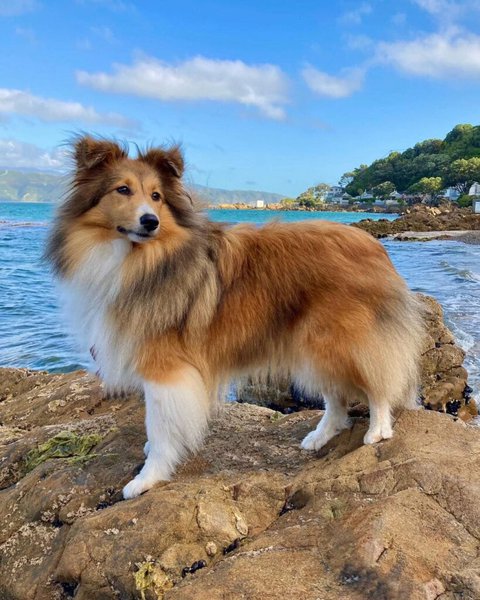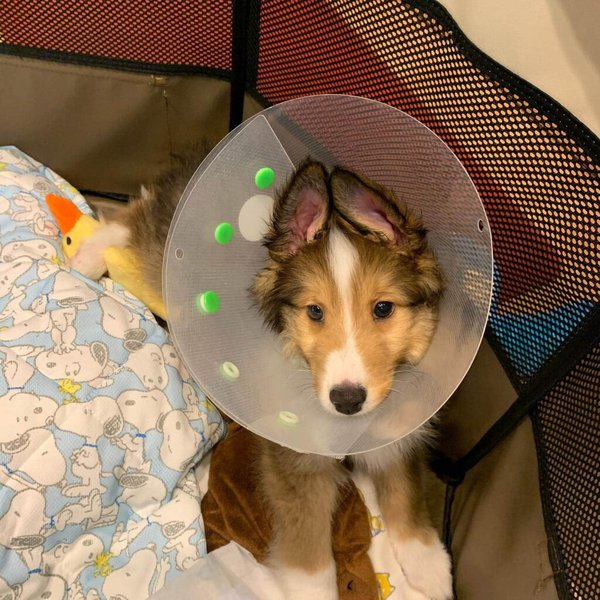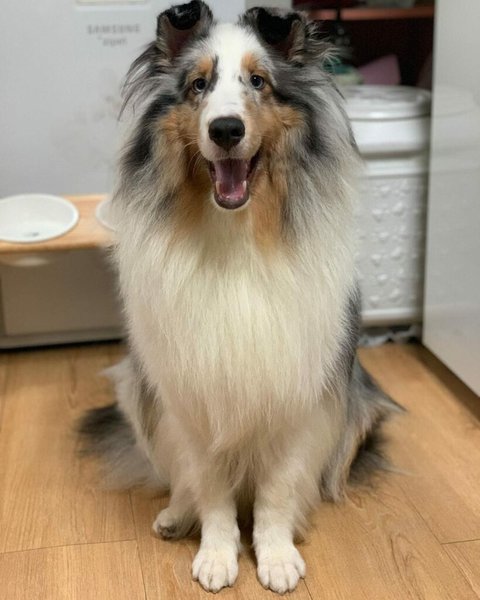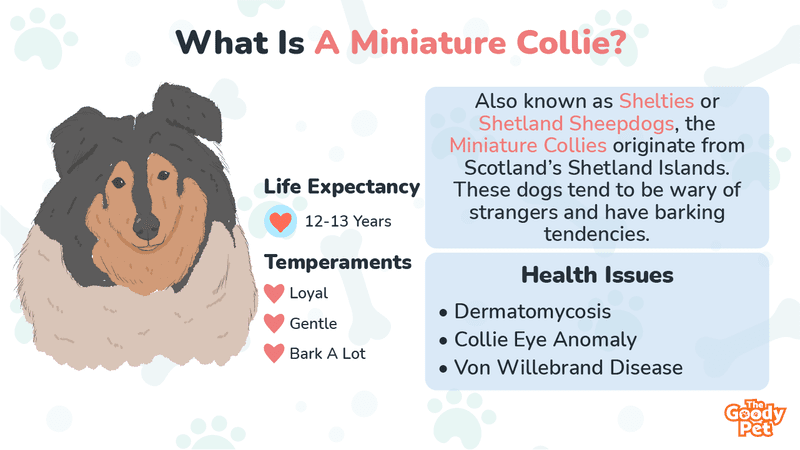Previously bred as a herding dog, the Miniature Collie can make a very good and alert watchdog. This sensitive dog is exceptionally smart, responds well to cues, and can easily be trained in therapy or service dogs. Are you planning to get a Miniature Collie, or would you want to learn more about this breed? I did the research, and here is what I have found. But first, what is a Miniature Collie?
Also known as Shelties or Shetland Sheepdogs, the Miniature Collies originate from Scotland’s Shetland Islands. These dogs tend to be wary of strangers and have barking tendencies. However, they do make up for these tendencies with their petite sizes, high energy level, and fun-loving personality.
If you are looking for an active and intelligent family dog, the Miniature Collie can be the one for you. Below is a comprehensive guide to Miniature Collies that will help you understand more about this energetic and beautiful breed. So, if you’re interested to learn more about this breed, keep reading.
How Big Do Miniature Collies Get?
Miniature Collies can get to between 13 and 16 inches tall at the shoulder area and have a weight of between 15 and 25 lbs. They are relatively small dogs.

How Did Miniature Collies Come To Be?
As its name implies, and you may think that a Miniature Collie is a smaller version of the purebred Collie or Rough Collie, this, however, is not the case.
Miniature Collies are a separate breed from the north of the United Kingdom, Scotland’s Shetland Islands, hence their name, Shetland Sheepdog. They also go by another fun nickname – the Toonie Dog, where “Toon” refers to a farm in Shetland language.
There are a great number of theories about what dogs are responsible for the Mini Collie. While some people say they are Border Collies and crossed with smaller purebreds, others believe they come from the Pomeranian and other Nordic dog breeds.
These dogs were mainly used to herd sheep, poultry, and ponies in harsh climates and rugged terrains. They originated from a region where the climate was often cold and harsh, the food was scarce, which might explain their diminutive size.
In 1909, the Miniature Collie was first recognized as the Shetland Collie by The Kennel Club in England. Two years later, in 1911, the American Kennel Club registered its first Mini Collie but under the “Shetland Sheepdog” name.
Physical Appearance
Miniature Collies come with straight, long outer coats with dense undercoats that can either be blue merle, sable colored, or black with some white markings.
This miniature breed also features small, and three-quarters erect ears as well as a wedge-shaped head.
What’s The Lifespan Of A Miniature Collie?
The lifespan of a Miniature Collie ranges from 12 to 13 years.
However, this might only be true for healthy dogs because those with health issues tend to live for a shorter time. Here are a few health issues to keep an eye out for:
Collie Eye Anomaly
This is an inherited and bilateral eye disease for dogs that affects the retina, sclera, and choroid. It can also sometimes cause blindness or only be a mild disease.
Dermatomycosis And Ulcerative Dermatosis
Ulcerative dermatosis is a skin disorder whose signs are bright red lesions and ulcers found in the inguinal and ventral abdominal regions of your Miniature Collie.
Von Willebrand Disease
Von Willebrand disease is a bleeding disorder where the blood doesn’t clot well. Dogs, especially Shelties, with this disease tend to have low levels of von Willebrand factor, which is a protein that helps in blood clotting, or the protein won’t work as it should.

Hip Dysplasia
A condition where the hip joint, also known as the ball and socket joint of the hip, doesn’t form properly in dogs. It can cause pain during movement, thereby impacting the mobility of your Miniature Collie.
Hypercholesterolemia
Hypercholesterolemia refers to high blood cholesterol levels, which can limit blood flow and increase the risks of a stroke or heart attack in a Sheltie.
Epilepsy
This is a chronic condition that leads to repeated seizures and is the most common chronic neurological condition in dogs, especially Miniature Collies.
Arthritis
Arthritis is a condition that affects the joints and involves inflammation or degeneration of the joints. It can cause pain when your Sheltie tries to use its feet, the most common part of its body.
Hyperthyroidism
This is a disease that affects the thyroid gland and happens when the dog produces excess thyroid hormone, causing an increase in your Miniature Collie’s metabolic rate to dangerous levels.
Gallbladder Mucoceles
Gallbladder mucoceles is a condition where the gallbladder distends abnormally because of excess accumulation of mucus in the lumen. It can lead to extrahepatic biliary tract disease in dogs, especially Shelties.
To ensure that the Miniature Collie you get has a great chance of being healthy and happy, you need to get one from a reputable breeder that uses healthy breeding methods. Taking your dog or puppy to a vet to get a full-body check-up is also recommended.
How To Take Care Of Your Miniature Collie?
Setting up exercise routines, providing a high-quality diet, adding multivitamin supplements, and using dental water additives are some of the important aspects to consider when taking care of your Miniature Collie.
Exercise Routines
Miniature Collies require quite a bit of exercise, at least 30 minutes daily, because they have significant energy since they were bred as working dogs. So apart from walking, you can provide the dog with new challenges like games and puzzles to keep them active and engaged.
High-Quality Diet
Miniature Collies don’t have a specific diet need but will do well with high-quality dog food and 3 cups of food daily. We recommend Pet Plate for vet-developed meals that are freshly prepared, nutritious and safe for your dog to consume.
Like other breeds, Miniature Collies will also develop allergies to chicken, wheat, and other common foods. However, if you notice your dog has a digestive reaction to any food, it is important to consult your veterinarian.
Multivitamin Supplements
Multivitamins will come in handy to supplement a healthy diet and ensure the dog remains healthy. It helps with skin and coat development, bladder support, overall health, and digestion. A good multivitamin should provide a great blend of antioxidants, minerals, and essential vitamins.
Using Dental Water Additives
Like mouthwash for humans, dental water additives help clean their dog’s teeth, gums, and mouth, leaving them looking fresh and healthy. They are usually added to the dog’s drinking water daily for dental cleaning, the same way humans use mouthwashes. These additives help prevent bad breath, reduce tartar buildup as well as kill bacteria.
Do Shelties Like To Cuddle? Temperaments Of Miniature Collies
Generally, most Shelties like to cuddle, although this can only happen when they establish a bond and relationship with the person. However, they cuddle for warmth, as a display of affection, to relieve stress, and to protect their owners if theirs is a threat.
These are smart and sensitive dogs making them great dogs for therapy and service work. They do well with obedience training since they pay attention to verbal cues and positive reinforcement. Sufficient early socialization is recommended for mental stimulation and activity.
Shelties shouldn’t be left alone for long periods, beyond 8 hours, because they may become destructive, and you may find some things in your home that have been chewed up. Instead, you can leave them with interactive toys to engage their mind.

Are Miniature Collies Good Family Dogs?
Miniature Collies can make good family dogs because they are highly trainable and eager to please their owners. Additionally, they are quite gentle, loyal, and obedient dogs. They are also good-natured, playful, and affectionate with children, making them a great choice for families with kids.
Do All Shelties Bark A Lot?
Shelties tend to bark a lot, and they can make effective watchdogs. This is because they are often wary of strangers and will bark to alert their owners of intruders. However, they may be too small to scare off intruders because of their size, and they’re not very protective.
Do Miniature Collies Shed A Lot? Grooming Tips For Miniature Collies
Miniature Collies shed their coats a lot throughout the year and more especially during spring and fall. Hence these dogs are not hypoallergenic.
Due to their long coats, routine grooming is required to reduce shedding and ensure their coats remain healthy.
Are Shelties High Maintenance?
While Shelties might seem to require extensive grooming because of their long coat, simple regular maintenance will ensure it remains healthy. The Shetland sheepdog is a loyal dog that enjoys the family’s company and likes to work.
Do Shelties Have A Lot Of Dander?
Since a Sheltie constantly sheds, especially during the shedding season, this means the dog has plenty of dander, which is a common allergen.
Here are some home remedies and grooming tips you can use to get rid of the excess dander as well as ensure the dog remains healthy.
Brush Their Coats Regularly
You’ll need to brush your Miniature Collie’s coat at least three times a week to prevent matting and control shedding.
Although there is a wide range of brushes that come in different, we recommend the FURminator Undercoat Tool for this specific breed. The brush is tight but with soft bristles to help remove loose fur and ensure it doesn’t scratch their coat.
Bathing Occasionally
The Sheltie needs to be bathed once in two months to avoid scraping out natural oils from its coat unless the dog is exceptionally dirty or has skin allergies.
Using the Pro Pet Works All Natural 5 In 1 Oatmeal Shampoo will ensure the dog remains healthy and also help eliminate the reactions that come with using other dog shampoos.
Other Grooming Tips
- Check and clean their ears at least once a week.
- Trimming their nails at least once a month.
- Brushing their teeth daily.
Related Questions
How Much Do Miniature Collies Cost? A Miniature Collie costs anywhere from $800 to $1,200, depending on several factors, including the puppy’s health and the breeder. Although it can be tempting to buy an inexpensive Collie, there you can end up with an unhealthy and poorly-bred dog. For this reason, it’s crucial to ensure the breeder uses healthy and safe breeding practices.
What Is The Difference Between A Sheltie And A Collie? Apart from their sizes, a distinguishing factor is the strength of the Collie and agility of the Sheltie. Although both breeds can make great family dogs, Collie is calm around strangers and tends to lay low, while Sheltie thrives for activity. In addition, Shelties, being the smaller ones, have shorter muzzles and a deeper curve between the eyes, while Collie has a broader, longer muzzle that is more cylindrical than the Sheltie.
Do Shelties Swim? Most Shelties can swim, and they enjoy swimming. Some of them love being in the water. Training and exposure from an early age may be required to ensure they are comfortable being around water. Although teaching your Sheltie to swim is worthwhile, it is important to note that some Shelties may never adapt to being in the water, even after some training and gradual desensitization to the fear.





